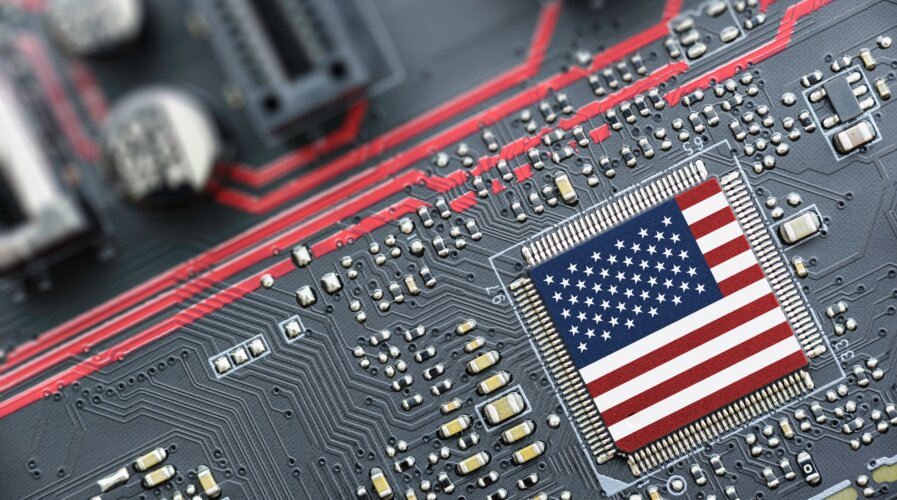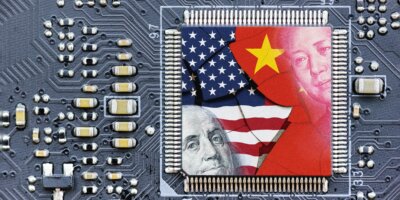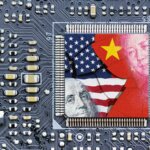
Intel said without orders from China, there would be much less need to proceed with projects such as Intel’s planned chip factory complex in Ohio.Source: Shutterstock
Chip players are urging the US to relook into curbs against China
- Intel said without orders from China, there would be much less need to proceed with projects such as Intel’s planned chip factory complex in Ohio.
- Intel’s Pat Gelsinger, Nvidia’s Jensen Huang, and Qualcomm’s Cristiano Amon warned that export controls risk harming US industry leadership.
When the United States (US) started imposing chip curbs on China and Chinese firms, many had warned that it could backfire – but the Biden administration did not back down. Instead, it added more layers to the export controls against China to scupper the Eastern powerhouse’s ability to get its hands on the semiconductors it needs for military modernization.
It hasn’t even been a year since the US government announced the first export control against China. Yet, the CEOs of three homegrown American chip giants— Nvidia, Qualcomm, and Intel — have been cautioning against heavy-handedness on the US’ most sweeping export controls yet. All three leaders were in Washington last week, pressing the Biden administration to exercise restraint on restricting their business with China.
“The companies are thinking of their bottom lines, yes,” Bloomberg stated in a report. But those chip giants are right to warn about cutting Beijing’s access to semiconductors. “Putting additional curbs on what semiconductor manufacturers can sell to the world’s second-largest economy will inevitably prompt the Chinese to retaliate and cause tensions with US chip-making allies,” the report added.
What’s worse is the restrictions threaten to undermine President Joe Biden’s longer-term goals of encouraging more chip manufacturing on US soil. “Without orders from Chinese customers, there will be much less need to go ahead with projects such as Intel’s planned factory complex in Ohio,” Intel’s Pat Gelsinger reportedly told US National Security Adviser Jake Sullivan, Secretary of State Antony Blinken, and other officials.
Meetings between the CEOs of three-chip giants and US officials took place in Washington on July 17. During those meetings, leaders of the largest US chipmakers told Biden officials that the administration should not just study the impact of restrictions on exports to China but also pause before implementing new ones.
“Intel’s Pat Gelsinger, Nvidia’s Jensen Huang, and Qualcomm’s Cristiano Amon warned that export controls risk harming US industry leadership. The Biden officials listened to the presentations but didn’t make any commitments,” Bloomberg reported, quoting people familiar with the matter.
To recall, Biden’s strategy on semiconductors revolves around “two tightly woven aims,” as Bloomberg puts it. The first impedes China’s ability to get its hands on the semiconductors it needs for military modernization. Then, embodied in the Chips and Science Act he signed into law last year, is to lessen US vulnerability to international supply chain chokepoints in East Asia by incentivizing chipmakers to invest in US-based research, development, and production.
Chip curb on China also means lesser money
The most prominent impact of reducing China’s access to very cutting-edge technology is it directly deprives American chip players of significant revenue streams that are helping to fund the multibillion-dollar projects that the Chips Act was designed to spur. In short, for the US, it is simply counterproductive.
To put into context how significant the Chinese market is to large chip players worldwide, China is the world’s largest commercial market for commodity semiconductors; the country represents about a fifth of Nvidia’s global revenue. As for Qualcomm, around 60% of its revenue is derived from supplying components to China, where most of the world’s consumer electronics are made.
To make matters worse, the Biden administration has been exploring ways to tighten existing curbs further — for example, by targeting chips made by Nvidia specifically for the China market. While the policy intended to slow China’s AI development, Nvidia’s Huang said that limiting sales of some of his chips had made alternatives more popular.
Even for Intel, without orders from Chinese customers, there will be much less need to go ahead with projects such as Intel’s planned factory complex in Ohio, the CEO said, according to the people. Gelsinger, who visited Beijing earlier this month to show off his company’s latest AI chips, counts the nation as Intel’s most significant sales region — with China providing about a quarter of its revenue.

CEO of Intel Corporation Pat Gelsinger. Source: Photo by ALEX WONG / GETTY IMAGES NORTH AMERICA / Getty Images via AFP.
“Overall, the executives argued that while Chinese customers have been forced to buy more chips to do the work of banned products, that hasn’t significantly slowed them down,” the Bloomberg report indicated. At the recent Aspen Security Forum, Gelsinger brought up the meetings in Washington. “We did communicate an essential message on China,” he said.
“Currently, China represents 25% to 30% of semiconductor exports. If I have 20% or 30% less market, I need to build fewer factories,” Gelsinger added. Following the meeting in Washington, the Semiconductor Industry Association (SIA) shared a similar sentiment stating that further steps by the Biden administration could backfire.
“Allowing the industry to have continued access to the China market, the world’s largest commercial market for commodity semiconductors is important to avoid undermining the positive impact of [the Chips and Science Act],” SIA said.
What’s next?
The meeting with the CEOs of American chip giants and the comments from the trade association comes amid rumors that the US is considering an extension of restrictions placed on the sale of specific advanced chips and semiconductor equipment to China. On July 21, Sullivan said he agreed with the executives that the approach needs to be a “small yard, high fence” — adequate but limited.
He, however, defended the administration’s actions to date as just that, saying the measures were targeted and had virtually no impact on US-China trade for most chips. “The vast majority of sales of chips designed by the US to China has continued unabated,” he said at the Aspen Security Forum. “It continues to this day.”
Sullivan also hinted that more curbs could follow but would only be implemented after robust discussions with the affected companies. “We are going to continue to look at very targeted, particular restrictions on technology with national security and military applications and make judgments rigorously, carefully, methodically — and, yes, in deep consultation with our private sector,” he concluded.
READ MORE
- 3 Steps to Successfully Automate Copilot for Microsoft 365 Implementation
- Trustworthy AI – the Promise of Enterprise-Friendly Generative Machine Learning with Dell and NVIDIA
- Strategies for Democratizing GenAI
- The criticality of endpoint management in cybersecurity and operations
- Ethical AI: The renewed importance of safeguarding data and customer privacy in Generative AI applications


